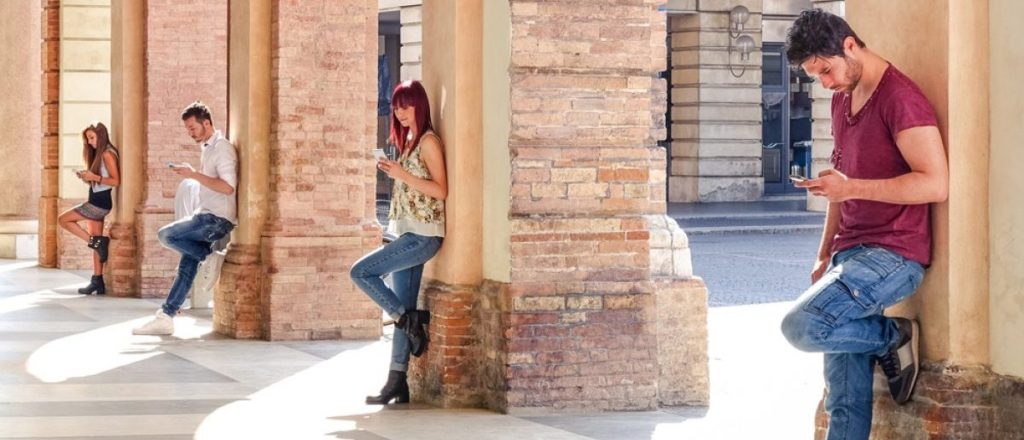
Group of young people using their smartphones, while showing mutual disinterest towards each other. (Courtesy: Shutterstock)
(Eric Lieberman, The Daily Caller News Foundation) – The more time a young adult spends on social media, the more prone they are to feeling lonely, according to a new study.
Scientists at the University of Pittsburgh School of Medicine conducted a study and found that frequently browsing and engaging in social media platforms like Facebook, Twitter, and Snapchat increases the probability of feeling socially isolated.
“This is an important issue to study because mental health problems and social isolation are at epidemic levels among young adults,” Brian A. Primack, director of Pittsburgh University’s Center for Research on Media, Technology, and Health, said Monday in an official press release.
The researchers specifically studied adults aged 19 to 32 by asking them to complete a questionnaire to determine how often and for how long they use the 11 most popular social media platforms at the time (e.g. Facebook, Twitter, Snapchat, YouTube, Google Plus, Instagram, Reddit, Vine, LinkedIn, Pinterest, Tumblr).
Even after controlling for a variety of demographic and social factors, participants who used social media for more than two hours a day were twice as likely to perceive themselves as lonely than their peers who spent less than 30 minutes on social media each day. Participants who visited social media platforms 58 or more times per week were three times as likely to perceive themselves as socially isolated when compared to people who visited such platforms less than nine times per week.
Such a finding contradicts the argument that increased social media use makes people feel more connected with other human beings.
Timothy Wilson, a psychology professor at the University of Virginia, published a study in 2014 in which he organized 11 experiments involving more than 700 people. He discovered that the majority of participants felt uncomfortable being alone in a room with their thoughts for only six to 15 minutes.
“We had noted how wedded to our devices we all seem to be and that people seem to find any excuse they can to keep busy,” Wilson explained, according to The New York Times. “No one had done a simple study letting people go off on their own and think.”
Wilson contends that people almost instinctively resort to their mobile devices when they are presented with a still moment or a brief period of free time. They highly prefer not to dwell on any negative aspects of their lives, and rather distract themselves by communicating with others and attempt to decrease introspection or the feeling of loneliness.
Primack addresses such a usual line of thought for social media impact.
“We are inherently social creatures, but modern life tends to compartmentalize us instead of bringing us together. While it may seem that social media presents opportunities to fill that social void, I think this study suggests that it may not be the solution people were hoping for,” he said.
But although there is correlation, it doesn’t prove causation, because of the typical “chicken or the egg” dilemma.
“We do not yet know which came first–the social media use or the perceived social isolation,” said senior author Elizabeth Miller, professor of pediatrics at The University of Pittsburgh and chief of the Division of Adolescent and Young Adult Medicine at Children’s Hospital of Pittsburgh. “It’s possible that young adults who initially felt socially isolated turned to social media. Or it could be that their increased use of social media somehow led to feeling isolated from the real world. It also could be a combination of both.”
Regardless, Miller says that the findings are significant because “even if the social isolation came first, it did not seem to be alleviated by spending time online, even in purportedly social situations.”
Content originally published at The Daily Caller.
Content created by The Daily Caller News Foundation is available without charge to any eligible news publisher that can provide a large audience. For licensing opportunities of our original content, please contact licensing@dailycallernewsfoundation.org.


Facebook
Twitter
Pinterest
RSS